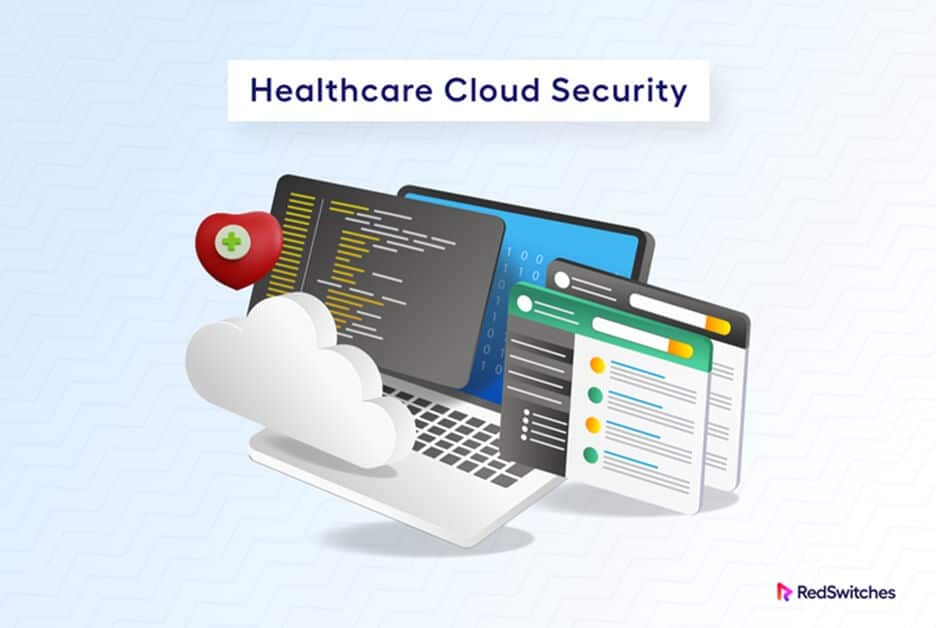Cyber threats in the health sector are increasing because of the black market value of the sensitive information it has. Cybercriminals can make a killing by selling patients’ data, medical research data, and proprietary data obtained from healthcare databases. Given this disturbing pattern, healthcare organizations must adopt a practical data security approach. Organizations can achieve this by employing proactive strategies against cyber threats and investing in robust healthcare cloud security.
Alarming statistics have shown that over 93% of healthcare organizations have experienced data breaches in the past three years. The consequences of these breaches in cloud security in healthcare organizations are immense, especially financially. In 2020, a study revealed that healthcare organizations spent around $7.13 million on data breaches.
This article will discuss the challenges of using cloud security and how to identify a suitable healthcare cloud service. We will also discuss cloud deployment models, healthcare cloud solutions, and where to find the proper cloud security healthcare.
Table of Content
- What is Cloud Security in Healthcare?
- Cloud Deployment Models
- Healthcare Cloud Solution
- Challenges in Using Healthcare Cloud Security
- Where to Find The Right Healthcare Cloud Security?
- Key Takeaways
- Conclusion
- FAQs
What is Cloud Security in Healthcare?
Picture Credits : Media iStock Photo
Cloud security refers to the protocols, procedures, and technologies employed to protect data in cloud computing environments. In healthcare, there are various forms of sensitive data to be secured. These include patients’ records, clinical applications, medical research data, etc. One of the aims of cloud security in healthcare is to ensure the confidentiality and integrity of stored data.
Some of the security challenges encountered in cloud computing in healthcare include; Data losses, malware attacks, breaches, etc. Some tools used to checkmate these challenges include firewalls, intrusion detection systems, data loss prevention solutions, and many others.
Organizations must implement some crucial technologies and protocols to ensure cloud security in healthcare. Some of these practices include:
- Vulnerability analysis and management: This means performing consistent scanning and checks on the cloud infrastructure to detect risks and vulnerabilities. Not just looking for weaknesses but also applying updates to alleviate such weaknesses and risks.
- Data encryption: Encryption will help to secure health care data from illegitimate access. Implementing robust cryptographic algorithms will ensure healthcare data integrity and security.
- Data isolation and segregation: In cloud environments, where different organizations store their various data, data segregation and isolation are essential. It can help to prevent unauthorized access from other organizations. Even within an organization, different departments can organize and segregate their different data to reduce the risk of data exposure.
- Robust access controls: These are measures to keep unauthorized persons from accessing data in cloud environments. Strong password policies and multifactor authentication are two strong access control measures.
- Secure data transmission: Data can be compromised while being sent from one system to another. Good cloud security for healthcare will employ protocols such as transport layer security to protect data in transit.
- Backup plans: There should be a data recovery and backup protocol in place in case of data theft, loss, system failures, etc. Backups should be stored safely and checked periodically.
Cloud Deployment Models
Cloud deployment in healthcare has to do with the use of cloud computing services to manage and secure healthcare data. There are different models when it comes to cloud computing for healthcare. These cloud deployment models help to secure data, save cost, and ease accessibility.
Each of the data deployment models has its advantages and drawbacks. Healthcare organizations should compare their needs, budget, and regulatory constraints when choosing a model. Healthcare organizations should only engage cloud service providers that aren’t just familiar with but comply with the health industry regulations. Some of these regulations include the Health Insurance Portability and Accountability Act (USA) and the General Data Protection Regulation (European Union).
Public Cloud
The public cloud is a cloud environment offered by third-party vendors. In the healthcare sector, organizations use them for analyzing and storing large amounts of data, hosting websites, etc. They are cheap and easy to access, but data security and privacy compliance can be an issue. Public cloud vendors include Microsoft Azure, Google Cloud Platform, and Amazon web services.
Private Cloud
The private cloud is a cloud environment created by only one organization. The private cloud model is primarily deployed when organizations want to store and secure sensitive data. In the healthcare sector, this sensitive data includes patients’ records, research data, etc. Most private cloud services comply with HIPAA and GDPR but can be costly.
Hybrid Cloud
The hybrid cloud is a model that allows healthcare organizations to gain from the advantages of the public and private clouds. Organizations can store their sensitive data in a private cloud while utilizing the public cloud for other needs. It is a flexible and cost-effective model.
Government Cloud
This is a cloud environment used by healthcare providers, health research agencies, and other health institutions run by the government. Data security and strict access control are a major priority in this model.
Healthcare Cloud Solution
This refers to how cloud computing secures, analyzes, and manages data in the healthcare industry. They help to drive efficiency and innovation in the healthcare sector while complying with regulatory bodies.
Infrastructure-as-a-Service (IaaS)
Infrastructure-as-a-Service (IaaS) offers virtual servers, storage, and network structures to healthcare organizations. This cloud infrastructure can help organizations manage large volumes of data without requiring a physical instrument. It is cost-effective, flexible, improves data security, and helps to increase data accessibility.
Platform-as-a-Service (PaaS)
PaaS (platform-as-a-Service) offers healthcare organizations application hosting infrastructures on the cloud. This way, healthcare organizations can build and deploy applications while leaving the maintenance of such infrastructures to the vendors.
Software-as-a-Service (SaaS)
Software-as-a-Service (SaaS) helps healthcare organizations access software applications without such applications being installed or maintained. They are granted access to these applications over the web, which offers easy access to information. It also reduces costs as the vendors carry out maintenance and upkeep.
Challenges in Using Healthcare Cloud Security
Picture Credits : Media iStock Photo
Different healthcare organizations encounter several cloud security challenges. It is the role of their cloud service providers to create solutions to these problems. Some of these challenges are:
- Compliance with regulations: Platforms like HIPAA have regulations on data privacy that healthcare organizations must follow. So, these organizations must ensure their cloud service providers understand and comply with these regulations.
- Security risks: With the high cost of healthcare data in the black market, healthcare cloud environments are a frequent target of cybercriminals. Organizations can resolve this problem by implementing security measures like data encryption, intrusion detection systems, etc.
- Choosing a vendor: Choosing a cloud service vendor is another challenge. A good cloud service provider will understand and comply with industry regulations and also have suitable data security protocols.
- Integration: Integrating large volumes of data from different sources is challenging. It requires a lot of assessment and planning.
- Downtime: Cloud downtime can have a negative effect on healthcare processes. Cloud service providers can mitigate this with sound disaster recovery and backup plans.
- Cost: Cloud security in healthcare has many advantages but also involves significant costs. Healthcare organizations must analyze the costs to pick a model suited for their operations.
Where to Find The Right Healthcare Cloud Security?
There are many cloud service providers(CSPs) around. Before choosing a CSP, organizations need to consider several factors. Below are some of the characteristics of a good cloud service provider:
- The suitable CSP will have a history of compliance with relevant regulatory bodies’ data privacy and security regulations. These regulations include the HIPAA Act in the United States and GDPR in the European Union.
- The CSP must have a proven track record of providing excellent cloud security for other organizations in the healthcare sector.
- A suitable CSP for a healthcare organization must fit within the budget of that organization. While the CSP must provide excellent cloud security, it must also be affordable to the organization.
- They must have a collaborative track record with other Healthcare organizations. This shows they are committed to understanding the specific cloud service problems of the healthcare sector.
- They must have a robust disaster recovery and a backup plan for data loss or breaches.
An organization should conduct proper research before choosing a cloud service provider. One CSP that meets all the criteria mentioned above is RedSwitches. RedSwitches is a highly respected cloud hosting service provider with a proven track record in the industry. They carefully evaluate business needs and provide secure cloud solutions tailored to such business needs while being compliant with regulations.
Key Takeaways
- Healthcare organizations must adopt proactive strategies against cyber threats by investing in robust cloud security services.
- Robust access control techniques like multifactor authentication and strong passwords will help secure healthcare data from breaches.
- A proactive approach to monitoring and detecting potential security threats is essential for all businesses. It should also have prompt incident response and remediation to mitigate risks and safeguard the brand’s reputation.
- Compliance with industry regulations is significant when choosing a cloud service provider. This demonstrates the brand’s commitment to protecting patient data and maintaining high cloud security standards.
Conclusion
Cloud security healthcare is very vital as it helps to ensure the protection of sensitive healthcare data from criminals. Healthcare organizations must proactively safeguard their data and comply with set regulations. When choosing a cloud service, factors like regulation compliance, track record, data recovery, and a backup plan should take priority.
One of the trusted and reliable cloud service providers is RedSwitches. RedSwitches offer high-level security against cyber threats plaguing Cloud security in healthcare. They provide advanced vulnerability analysis and comprehensive security protocols and comply with industry regulations like HIPAA and GDPR.
Redswitches enhance healthcare cloud security and data integrity in any organization they work with. Choosing RedSwitches means that healthcare organizations can focus on their primary assignment of providing excellent care to patients.
Frequently Asked Questions
Q-1) Which is the best cloud platform for healthcare?
The best cloud platform must possess the features and characteristics required to ensure data security for healthcare organizations. These features include regulation compliance, scalability, robust data security measures, etc. Big cloud security platforms like Google Cloud and Microsoft Azure offer the abovementioned features. They also have a good track record of helping healthcare organizations build reliable cloud services.
Q-2) Which company is used for cloud security?
Many well-known companies help organizations secure their data with cloud security solutions. Some of these companies include Microsoft, Google, IBM, and Amazon. Their cloud security platforms include Azure security center, Google Cloud Platform, IBM Cloud security, and AWS security services.
Q-3) What are the main challenges in cloud security?
One of the main challenges in cloud security is compliance with industry standards and regulations. It is not enough to secure data in the cloud, cloud service providers must follow the industry regulations.
Another challenge is data loss. Downtime may occur at any moment. A good cloud deployment service will execute excellent data recovery protocols to regain lost data.
Preventing unauthorized access from employees within the organization is another serious challenge. Organizations can mitigate this problem by using strong access controls like multifactor authentication.
Q-4) What healthcare cloud deployment model is the most efficient?
This depends on the specific needs and priorities of the organization. If the primary emphasis is on cost-effectiveness, the best option is the public cloud. For tight data security, a private cloud is the best choice. Hybrid clouds combine the advantages of both private and public clouds.
Q-5) Why is security important in healthcare data?
It is because healthcare databases contain very sensitive data that needs to be protected from cybercriminals. Patients’ records, research data, and clinical applications are examples of these sensitive data. Cloud Security in healthcare helps to enhance the integrity of healthcare data.



